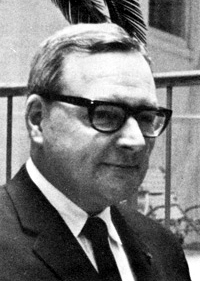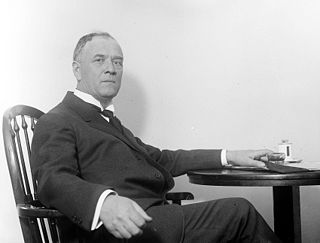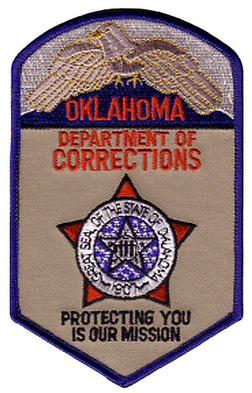Related Research Articles

The governor of Oklahoma is the head of government of the U.S. state of Oklahoma. Under the Oklahoma Constitution, the governor serves as the head of the Oklahoma executive branch, of the government of Oklahoma. The governor is the ex officio commander-in-chief of the Oklahoma National Guard when not called into federal use. Despite being an executive branch official, the governor also holds legislative and judicial powers. The governor's responsibilities include making yearly "State of the State" addresses to the Oklahoma Legislature, submitting the annual state budget, ensuring that state laws are enforced, and that the peace is preserved. The governor's term is four years in length.

Richard Buell Ogilvie was the 35th governor of Illinois and served from 1969 to 1973. A wounded combat veteran of World War II, he became known as the mafia-fighting sheriff of Cook County, Illinois, in the 1960s before becoming governor.

James Brooks Ayres Robertson, sometimes called J. B. A. Robertson, was an American lawyer, judge and the fourth governor of Oklahoma. Robertson was appointed by the state's first governor, Charles N. Haskell, to serve as a district judge.

The State Corporation Commission, or SCC, is a Virginia (USA) regulatory agency whose authority encompasses utilities, insurance, state-chartered financial institutions, securities, retail franchising, and railroads. It is the state's central filing office for corporations, limited partnerships, limited liability companies and Uniform Commercial Code liens.

The Legislature of the State of Oklahoma is the state legislative branch of the U.S. state of Oklahoma. The Oklahoma House of Representatives and Oklahoma Senate are the two houses that make up the bicameral state legislature. There are 101 state representatives, each serving a two-year term, and 48 state senators, who serve four-year terms that are staggered so only half of the Oklahoma Senate districts are eligible in each election cycle. Legislators are elected directly by the people from single member districts of equal population. The Oklahoma Legislature meets annually in the Oklahoma State Capitol in Oklahoma City.
The Tennessee Commissioner of Correction is the head of the Tennessee Department of Correction, which supervises inmates in the state prisons of the U.S. state of Tennessee. The incumbent Commissioner of Correction is Frank Strada, who took office on January 9, 2023.

The Constitution of the State of Oklahoma is the governing document of the U.S. State of Oklahoma. Adopted in 1907, Oklahoma ratified the United States Constitution on November 16, 1907, as the 46th U.S. state. At its ratification, the Oklahoma Constitution was the lengthiest governing document of any government in the U.S. All U.S. state constitutions are subject to federal judicial review; any provision can be nullified if it conflicts with the U.S. Constitution.

The lieutenant governor of Oklahoma is the second-highest executive official of the state government of Oklahoma. As first in the gubernatorial line of succession, the lieutenant governor becomes the new governor of Oklahoma upon the death, resignation, or removal of the governor. The lieutenant governor also serves as the president of the Oklahoma Senate, and may cast a vote to break ties in that chamber.

The Secretary of State of the State of Oklahoma is the chief clerical officer of Oklahoma and a member of the Oklahoma Governor's Cabinet. The Secretary of State is the only appointed constitutional member of the executive branch of the Oklahoma state government. The office of Secretary of State was elective from statehood until 1975 when the Constitution was amended and it became an appointive office, running concurrent with the Governor effective in 1979.

The Secretary of State of Wisconsin is a constitutional officer in the executive branch of the government of the U.S. state of Wisconsin, and is second in the line of succession to the office of Governor of Wisconsin. Twenty-nine individuals have held the office of Secretary of State, two of whom have held non-consecutive terms. The incumbent is Sarah Godlewski, who was appointed by Governor Tony Evers on March 17, 2023 to replace long-time Secretary of State Doug La Follette.

The Constitution of the Democratic Socialist Republic of Sri Lanka has been the constitution of the island nation of Sri Lanka since its original promulgation by the National State Assembly on 7 September 1978. As of October 2022 it has been formally amended 21 times.

The government of the U.S. State of Oklahoma, established by the Oklahoma Constitution, is a republican democracy modeled after the federal government of the United States. The state government has three branches: the executive, legislative, and judicial. Through a system of separation of powers or "checks and balances," each of these branches has some authority to act on its own, some authority to regulate the other two branches, and has some of its own authority, in turn, regulated by the other branches.

The Oklahoma State Auditor and Inspector is an elected Constitutional officer for the U.S. State of Oklahoma. The State Auditor and Inspector is responsible for auditing and prescribing bookkeeping standards of all government agencies and county treasurers within Oklahoma. The office in its current form is a consolidation of the office of State Auditor with that of the office of State Examiner and Inspector, both of which dated back to statehood in 1907. The two positions were combined in 1979 after passage of State Question 510 in 1975. Tom Daxon was the first person to hold the combined office and the first Republican as all previous occupants of either position were Democrats.
The Oklahoma State Superintendent of Public Instruction, sometimes called the Oklahoma State School Superintendent, is the chief executive officer for the Oklahoma State Department of Education and the president of the Oklahoma State Board of Education. The State Superintendent of Public Instruction is responsible for overseeing, implementing and reviewing the policies of the Oklahoma's public school system.
The Oklahoma Commissioner of Labor is an elective executive officer of the State of Oklahoma. The Labor Commissioner serves as the head of the Oklahoma Department of Labor. The Labor Commissioner is responsible for supervising the administration of all state laws relating to labor and workplace safety and gathers and publishes information about the workforce of Oklahoma.

The Oklahoma Department of Corrections is an agency of the state of Oklahoma. DOC is responsible for the administration of the state prison system. It has its headquarters in Oklahoma City, across the street from the headquarters of the Oklahoma Department of Public Safety. The Board of Corrections are appointees: five members are appointed by the Governor; two members are appointed by the President Pro Tempore of the Senate; and two members are appointed by the Speaker of the house of Representatives. The board is responsible for setting the policies of the Department, approving the annual budget request, and working with the Director of Corrections on material matters of the agency. T. Hastings Siegfried is the current chairman of the board. The director, who serves at the pleasure of the governor, is the chief executive of the department. The current director of Corrections is Scott Crow, who was appointed after Director Joe Allbaugh resigned his post on June 13, 2019. Crow was confirmed by the Oklahoma State Senate as director in May 2020.
The Office of the Oklahoma State Fire Marshal (OSFM) is an agency of the government of Oklahoma responsible for preventing and investigating loss of life and destruction of property caused by fire. OSFM accomplishes its mission through public education, criminal investigations, building inspections, and fire code enforcement activities.

The Oklahoma Department of Libraries (ODL) is a department of the state of Oklahoma and serves as the official state library for the state of Oklahoma. ODL provides information services and management to the state, assists local public libraries, and coordinates statewide library and information technology projects.

The Oklahoma State Banking Department (OSBD) is an agency of the state of Oklahoma. The Banking Department is responsible for regulating Oklahoma's banking system, including state-chartered banks, credit unions, savings and loan associations, and trust companies, as well as [(money transmitters)] and money order companies. The department also handles consumer complaints involving state-regulated financial institutions.

Mabel Luella Bourne Bassett was a Democratic Oklahoma politician who served as the state's Commissioner of Charities and Corrections from 1923 until 1947.